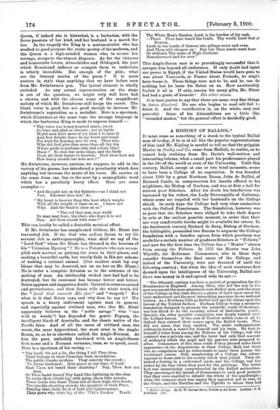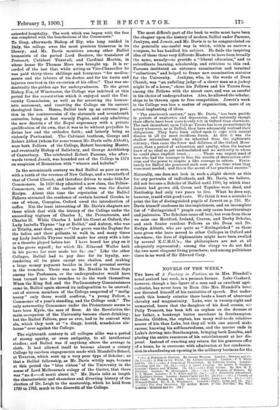A HISTORY OF BALLIOL.*
IT must come as something of a shock to the typical Balliol man of to-day, if he is at all like the popular representations of him (and Mr. Kipling is careful to tell us that the priggish
Master in Stalky and Co. came from Balliol), to realise, as be cannot help realising from Mr. Davis's well-written and interesting volume, what a small part his predecessors played in the life of the world or even of the University. Until this century, Balliol, except ab one or two brief moments, seems to have been a College of no reputation. It was founded
about 1260 by a great Northern Baron, John de Balliol, of Barnard Castle, in compensation for insults offered to his neighbour, the Bishop of Durham, and was at first a hall for sixteen poor Scholars. After his death his benefaction was increased by his widow, the Lady Dervorguilla of Galloway, whose arms are impaled with her husband's on the College shield. In early days the College had very close connection
with the Oxford Franciscans. The foundation, however, was so poor that the Scholars were obliged to take their degree in arts at the earliest possible moment, in order that their not very comfortable berths might be available for others. In
the fourteenth century Richard de Bury, Bishop of Durham, the bibliophile, persuaded two Barons to augment the College foundation with a benefice apiece, from which provision was
made for a certain number of graduate Scholars or "Fellows,"
and now for the first time the College has a "Master" chosen from among the Fellows. In 1361 the Master was John Wycliffe, the Reformer. Commoners, who in these days consider themselves the final cause of the College, and
indeed of the University, were not dreamed of until the following century; but when the idea of such creatures first dawned upon the intelligence of the University, Balliol saw there was money in it and spread wide its net :—
" The fifteenth century was here a period of preparation for the Renaissance in England. Among those who led the way in the now movement the more prominent were Balliol men, and the story of the College at this time throws a gleam of light upon one of the least understood and the most interesting passages in our national history. As a Northern College Balliol had special claims upon the favour of the Yorkist faction. Durham College being a monastic foundation designed to promote the scientific study of theology, was less fitted to be the training school of fashionable youth ; Queen's, the other possible competitor, was deeply tainted with the Lollard heresy. If the sons of Yorkist nobles came at all to Oxford they entered their names upon the Balliol books. This did not mean that they resided. The noble undergraduate ordinarily hired a hostel for himself and his train. He took to himself a tutor from among the Fellows of his College, but the contract was a private one, and the tutor had only that amount of authority which the pupil and his parents were prepared to allow. Commoners of this class could if they pleased make their appearance at the disputations in their College Hall, but there was no compulsion and no inducement to make them pursue the hackneyed course. Still, membership of a College was advan- tageous to them and to the society which they joined. They ob- tained a footing in a cultivated circle, and the College was the richer by the fees which they paid for the privilege. The latter fact was immediately comprehended by the Balliol authorities. They encouraged the inrush of Commoners to such good purpose that they were enabled to rebuild the whole of the quadrangle ; when the treasure-chest was empty they appealed, not in vain, to the Grays, and the Nevillea and the Tiptofta to whom they had • Sallie, College. By H. W. Carless Davis, Fellow of All Souls. London : F. E. Robinson. [5s.] extended hospitality. The work which was begun with the fees VMS completed with the benefactions of the Commoners."
To Gray, afterwards Bishop of Ely, who long resided in Italy, the college owes the most precious treasures in its library; and Mr. Davis mentions among other Balliol humanists of the period Lord Berners, the translator of Froissart, Cuthbert Tunstall, and Cardinal Morton, in whose house Sir Thomas More was brought up. It is re- corded of the last that while acting as Vice-Chancellor he was paid thirty-three shillings and fourpence "for medica- ments and the labours of his doctor, and for his hurts and injuries received in the execution of his office." That was un- doubtedly the golden age for undergraduates. To the great Bishop Fox, of Winchester, the College was indebted at this period for the constitution which it enjoyed until the Uni- versity Commission, as well as for arresting the human- istic movement, and resetting the College on its ancient theological lines. Hence, Balliol took up an extreme posi- tion in the controversies of the sixteenth and seventeenth centuries, being at first warmly Papist, and only admitting the new doctrin e of the Royal supremacy with a private qualification of its own, that it was to be without prejudice to divine law and the orthodox faith ; and latterly being as violently Puritanical. The Calvinist brethren, George and Robert Abbot (whom for some reason Mr. Davis calls Abbott), were both Fellows of the College, Robert becoming Master, and eventually Bishop of Salisbury, and George Archbishop of Canterbury. The celebrated Robert Parsons, who after- wards turned Jesuit, was hounded out of the College in 1574 on suspicion of Romanism with " whouts and hobubs."
In the seventeenth century we find Balliol as poor as ever, with a tenth of the revenue of New College, and a twentieth of that of Christ Church, and therefore driven to make bids for Commoners. In 1610 they admitted a new class, the Fellow- Commoners, one of the earliest of whom was the diarist Evelyn. About this time the reputation of the Balliol Fellows attracted the residence of certain learned Greeks, to one of whom, Conopius, Oxford owed the introduction of coffee. Not the least interesting of Mr. Davis's chapters are those which deal with the history of the College under the succeeding regimes of Charles I., the Protectorate, and Charles II. While Charles I. held his Court at Oxford, the Lady Isabella Thynne " lay at Balliol," and Aubrey, who was at Trinity, next door, says :—" Our grove was the Daphne for the ladies and their gallants to walk in, and many times my Lady Isabella Thynne would make her entry with a lute or a theorbo played before her. I have heard her play on it in the grove myself ; for which Mr. Edmund Waller bath in his poems for ever made her fa,- ..Ais." Like the other Colleges, Balliol had to pay dear for its loyalty, sur- rendering all its plate except one chalice, and making a large money payment besides in lieu of personal service in the trenches. There was no Mr. Ruskin in those days among the Professors, or the undergraduates would have been turned into the trenches to do the work themselves. When the King fled and the Parliamentary Commissioners came in, Balliol again showed its indisposition to be coerced; out of sixteen members of the College suspected of " malig- nancy" only three would conform, "a young Fellow, a Commoner of a year's standing, and the College cook." The only noteworthy Commoner under the Protectorate seems to have been Kyrie, the man of Ross. At the Revolution the main occupation of the University became claret-drinking ; but the Balliol Fellows, poor as ever, had to be content with ale, which they took at " a dingy, horrid, scandalous ale- house" over against the College.
The eighteenth century in all colleges alike was a period of strong apathy, or even antipathy, to all intellectual studies; and Balliol was if anything above the average in sloth. It had allowed itself to become almost a county College by careless engagements made with Blundell's School, at Tiverton, which sent up a very poor type of Scholar; so that a Balliol fellowship, as Mr. Davis wittily says, became at this period the " blue ribbon" of the University in the sense of Lord Melbourne's eulogy of the Garter, that there was "no d—d merit about it." Mr. Davis tells at length the characteristic and shameless and diverting history of the election of Dr. Leigh to the mastership, which he held from 1726 to 1785, mach to the discredit of the College. The most difficult part of the book to write must have been the chapter upon the history of modern Balliol under Parsons,
Jenkyns, and Jewett, and Mr. Davis is to be congratulated on the generally successful way in which, within so narrow a compass, he has handled his subject. He finds the inspiring idea of these three very different Masters to have been broadly the same, namely—to provide a " liberal education," and to subordinate learning, scholarship, and criticism to this end.
Parsons instituted an entrance examination and terminal "collections," and helped to frame new examination statutes for the University. Jenkyns, who, in the words of Dean Church, was "an unfailing judge of a clever man as a jockey might be of a horse," chose his Fellows and his Tutors from among the Fellows with the nicest care, and was as careful in his choice of undergraduates. Also, he allowed the scholar_ ships to be thrown open to free competition. Jowett's work in the College was less a matter of organisation, more of an actual implanting of ideas.
" The nineteenth century," says Mr. Davis, " has been prolific in periods of exaltation and depression, and naturally enough their effects have been more keenly felt in Oxford than elsewhere. The task incumbent upon College Tutors has been proportionately heavy whenever, as in Balliol, they have adequately realised their obligations. They have been called upon to cope with mental disease in all its most insidious forms. At first it was the shallow rationalism which we inherited from the eighteenth century ; then came the fever and delirium of the Oxford Move- ment, then a period of exhaustion and apathy, when the learner knew of no ideal as yet undemolished and no authority in whom
he could place implicit trust There was urgent need of men who had the courage to face the results of destructive criti- cism and the power to inspire a like courage in others. Fortu- nately for Balliol she possessed such men at the time when they were most needed; and this is the secret of her practical success."
Naturally, one does not look in such a slight sketch as this for any portraits of individuals, and Mr. Davis, we believe, did not become a Scholar of Balliol until 1890, by which time Jowett had grown old, Green and Toynbee were dead, and Nettleship had only two years to live. What he does say, however, is said with good taste. We think it was a mistake to print the list of distinguished pupils of Jowett on p. 216. Mr.
Davis himself confesses its incompleteness, and an incomplete list of " distinguished " people can only cause heartburnings and jealousies. The Scholars come off best, but even from them we miss one Hertford, Ireland, Craven, and Derby Scholar, and such Senior resident Fellows as the Dean and Dr.
Evelyn Abbott, who are quite as " distinguished " as those
here given who have moved to other Colleges in Oxford and elsewhere; the lists of diplomatists might have been swelled by several K.C.M.G.'s ; the philosophers are not at all
adequately represented ; among the clergy we do not find the two most eloquent living preachers; and among politicians there is no word of Sir Edward Grey.







































 Previous page
Previous page